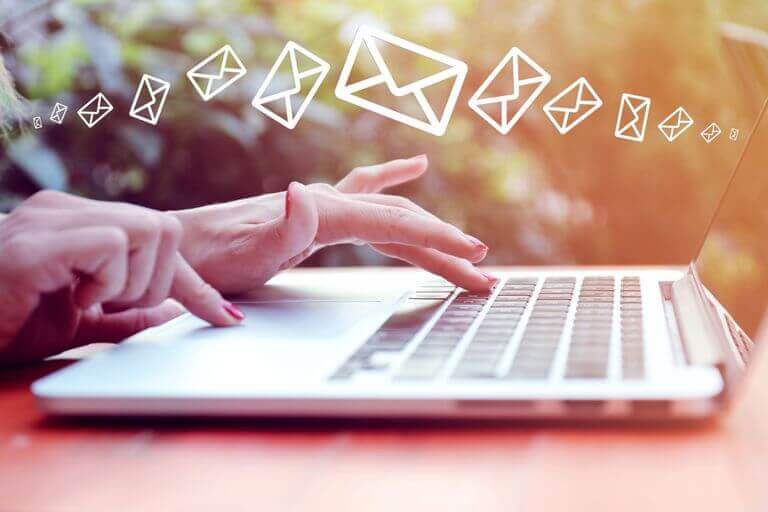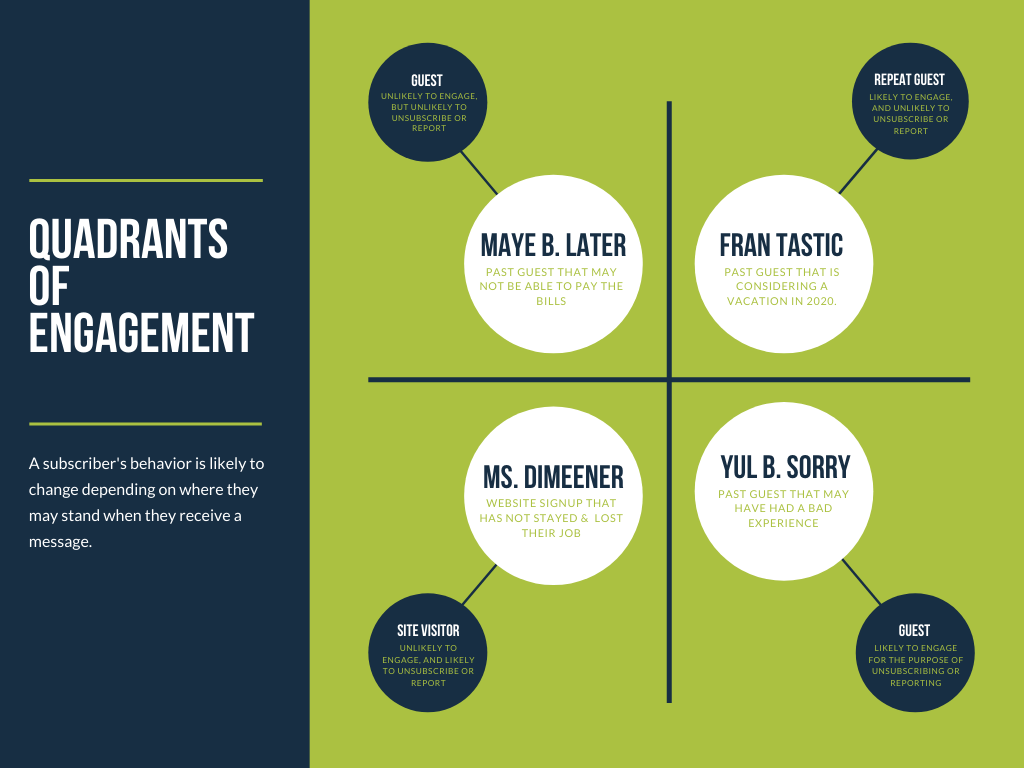
With a recovery period fast approaching, now is the time for hotels to prepare their post-crisis email marketing tactics.
NB: This is an article from Fuel Travel
Email is a highly effective, budget friendly marketing tactic that all hotels should be taking advantage of, especially during a time of crisis and recovery.
Let your data drive your post-crisis email marketing efforts.
Hopefully, you’ve done a good job of collecting guest information and behavioral data. If not – it’s not too late to survey your database to gauge sentiment or ask them to update their preferences! Appending responses to database entries will allow you to target at a more granular level during recovery.
Deliverability and Engagement
The relationship between your brand and the consumer varies throughout the year for each individual and depends on both their history with you and their propensity to plan a trip at the current moment in time. Depending on where they stand when they receive your message, their behavior may change.

There are some clear examples of subscribers that are likely to engage.
- A guest that consistently opens and interacts with your email
- A guest that has stayed and had a good experience
However, there are also some not-so-obvious guest profiles to pay attention to.
- A guest who has stayed and is thinking about a vacation – likely to engage
- A guest who has stayed but is worried about making their mortgage payment – unlikely to engage but also unlikely to unsubscribe or mark as spam
- A guest who typically flies to their destination of choice but is fearful of safety – unlikely to engage, potentially likely to unsubscribe, unlikely to mark as spam
- A guest who has stayed but didn’t have a particularly good experience – likely to engage for the purpose of unsubscribing or marking as spam
- An email signup from your website who has not stayed and just lost their job – unlikely to engage and likely to unsubscribe or potentially mark as spam
We understand that not all of the information mentioned in these examples is available from a marketing perspective. However, there are steps you can take to ensure that you are aren’t bolstering unnecessary unsubscribes or spam complaints (or diminishing your already-delicate KPIs).
Monitor the behavior of your database during your initial post-crisis recovery sends and tweak your segmentation to exclude inactive subscribers. *Remember, email service providers look at subscriber activity and will potentially penalize you, which could impact future deliverability. Excluding groups that fall into the category of unlikely to engage or likely to unsubscribe or mark as spam (at least for now) will protect you in the long run. Click here to learn more about why you may be losing subscribers.
Segmentation
In order to maximize potential engagement and minimize the likelihood of unsubscribes or spam complaints, segmentation is a must. There are a variety of audience segments that hotels can (and should!) be taking advantage of, especially during the COVID-19 recovery period. By breaking subscribers into smaller groups, you can provide them with more relevant messaging, increasing their potential to convert.
Active Subscribers
Anyone who has engaged with an email within a certain period of time
Engaged subscribers have an affinity with your brand and including them can send a good signal to email service providers and boost deliverability rates.
*Determining this timeframe will depend on the frequency of your sends and / or the purchasing cycle of your consumer.
Website Behavior Segmentation
Anyone who has visited the website in the past 30 days
If you’re tracking website behavior, you should be able to target recent site visitors that were either already in your database or have opted in to receive marketing messaging. A specific message calling out that you noticed they visited could keep you top-of-mind.
Anyone who has signed up for your newsletter within the past 30 days
If someone has actively signed up for your newsletter, they want to hear from you. You may want to consider sending this group of people different messaging than what you might send to your guest history list. They may still be shopping for their vacation and communicating with them in a timely manner is critical in helping them choose you.
Guest History Segmentation
Recent Cancellations
Targeting recent cancellations is like reaching for low hanging fruit. This group has already made the choice to stay with you once, so following up with them to reschedule is a no-brainer. Email is just one way of contacting cancelled reservations. Check out other ways you can recover your hotel’s canceled reservations due to COVID-19.
Repeat Guest
You can safely assume that you have likely instilled confidence in repeat visitors. If these guests are considering travel in 2020, it’s likely that they might choose you. Be sure you’re top-of-mind by reaching out with a personalized message inviting them to stay again.
Geographic Segmentation
Drive Market
Once you’ve determined how far your guests are willing to drive to visit your destination, there are several ways you can segment your database to target them. Zip code, city and state are just a few options. Check out our guide to targeting drive markets.
Keep in mind that survey respondents said they would be willing to drive the below distances within one month of COVID-19 restrictions being lifted:
– 38% ~2 hours from home
– 22% ~6 hours from home
– 16% ~10 hours from home
Local Market
Similar to your drive market segment, you can promote targeted messaging to areas immediately surrounding your property.
Event or Interest-Based Segmentation
Upcoming or Rescheduled Events
Many events have been moved due to COVID-19 closures. People are craving socialization and highlighting events during the recovery period will help entice them to travel. If guests planned to stay with you for a particular event, be sure to let them know the new event dates and ask them to reschedule their stay if they have cancelled.
Interest-Based Content
If you have done a good job of collecting subscriber data, you probably have an idea of what your guests are interested in. Incorporating content related to specific interests like golf, area dining, or entertainment will help grab the attention of a potential guest and keep them engaged.
Messaging
Value > Frequency
What brand perception is your messaging creating with the consumer?
Varying industries warrant different recovery tactics, including distinct messaging. For example, the mega-brand Amazon can send multiple messages a day, because users are actively and constantly engaged with them. The likelihood of someone either not opening, unsubscribing, or (worst of all) marking them as spam, is very low. Unfortunately, we can’t say the same for hotels and the value that you provide is more important than how often you’re sending.
If you do plan to send more frequently, keep in mind that the normal levers are not working right now. Offering a discount is not a guaranteed conversion. The guest is consumed with fear. You must convey value and reassure them by acknowledging and addressing their concerns:
– Are my dates flexible if circumstances change?
– Will I be penalized if I cancel my reservation?
– What incentives are being offered?
– What is the property doing to protect me? To protect the staff?
– How clean are the rooms and common areas?
– How can I avoid contact with other people while I’m there?
– What amenities are going to be available and will they be safe?
– Can I drive instead of fly?
– Have area restaurants or attractions reopened?
Instill confidence in potential guests by making it easy to find the answers to these questions, whether it is directly in the email body or linked to within the email content.
Create and include relevant content for each segment that you plan to target. For example:
- Drive Market – Calculate the cost to drive from specific cities, or include up-to-date parking policies for your property
- Local Market – Promote staycations, local discounts, area partnerships or anything else that might resonate with your local market
- Recent Signup – Mention that you noticed the recent interaction. Ask the user how you can help or to update their preferences so you can collect additional subscriber data. This may also be a good time to share any planning tools that you might have if the subscriber hasn’t stayed with you previously.
Sentiment
It is imperative that you make sure your messaging is appropriate, given the circumstance. Try to be sympathetic with your audience. While it’s okay to spread positive vibes, it’s not okay to disregard or publicly disagree with your destination’s policies for a successful recovery. Ensuring that the guest is your highest priority and aligning with your market’s stance will pay off in the long run. Don’t make the mistake of assuming subscribers will be willing to spend their stimulus checks on travel. Recent survey data suggests that they will be using this money to pay bills and purchase essentials.
While each segment warrants unique content, up-to-date information on your hotel’s post-COVID-19 policies should be included in all emails (for the foreseeable future). People may be influenced differently, however they are collectively concerned for their well-being.
Execution
Unfortunately, many people have lost their jobs in the midst of the coronavirus outbreak, and teams are operating at minimum capacity. Marketers have taken on additional roles and may not have the expertise to execute complex or advanced email marketing campaigns.
If you’re struggling, look to your CRM. Many platforms offer robust help sections and may even offer online support or live chat services. There are also online how-to videos, articles and group forums that you can take advantage of.
Make sure that you are still taking best practices into consideration when executing your post-crisis recovery email marketing tactics. Do your best to avoid being caught in a spam filter by sending from a reputable IP address and verified domain. You should also A/B test when possible to further elevate your already-optimized campaigns!




